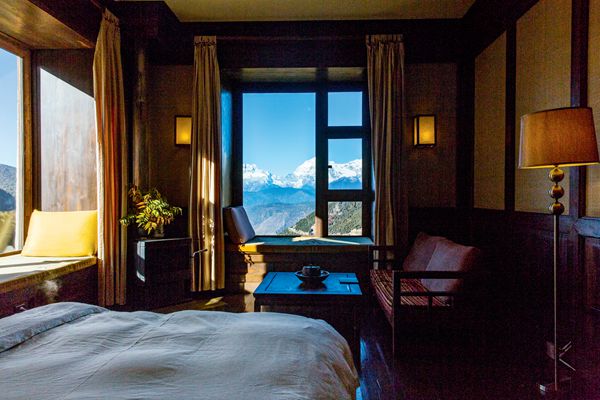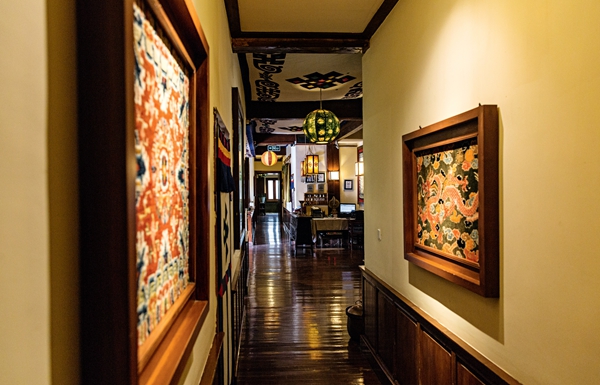A romantic escape to pristine Shangri-La
- By Wang Shuo
 0 Comment(s)
0 Comment(s) Print
Print E-mail China Today, February 6, 2017
E-mail China Today, February 6, 2017
Breathtaking View
The operation didn't go well at first, due to cashflow problems. Baima invited professionals from Germany and Austria to help, but to no avail.
In 2003, Baima decided to run the hotel himself. He stayed there and shared with his workers his ideas about a cultural experience. Baima also hired locals who were able to introduce Tibetan religion, culture and history to guests. "I want my guests to experience local culture and enjoy living closer to nature," said Baima.
|
|
|
Songtsam Meili Lodge, hidden in a small Tibetan village, all of whose windows offer imposing views of Minling Mountain. |
The increasing fame of the hotel attracted many investors, but Baima turned them down: "I knew I was not ready to introduce capital at that time." Diqing is where the three rivers – Jinsha River, Lancang River, and Nujiang River – run parallel and create breathtaking scenery. Baima believes the tourist resources in Diqing are rare and precious. "I didn't open the lodge to make money. Unless I have a suitable plan to develop it, I'd better not. Better to leave it to offspring."
Baima spent almost a decade on research and experiments, but never pursued aggressive expansion or heavy publicity. In 2006, Baima met a partner who shared similar thoughts and they made their plan. In 2009, the Songtsam Linka Retreat, a watchtower-style building which sits on the mountain slope opposite the Ganden Sumtseling Monastery, opened. Since 2011, the four Songtsam hotels in the hinterland of Diqing opened one after another.
In handpicked locations, all lodges enjoy beautiful natural settings. Combining stays at different lodges, one can form a circuitous trip with Songtsam Linka as its center. "We hope that our hotels are like the courier stations in olden times where visitors can stay for a rest and enjoy different views at each lodge."
Departing from the Shangri-La Lodge, it takes about one hour's drive to Benzilan Lodge, which lies along a stretch of the Jinsha River. Benzilan Lodge was established in a small village hidden in the valley, and houses only 10-odd families. A sandstone road connects it with the outside world, but in history it was a stop along the Tea-Horse Trail. The windows of the lodge rooms face gorgeous views of a mountain pass and under the windows is cropland belonging to local households.
|
|
|
Songtsam Shangri-La (Lügu) Lodge features a wide range of Tibetan-style ornamentations and furniture, including wooden cabinets, figures of Buddha, Thangka paintings and tapestries. |
Leaving the Benzilan Lodge and climbing the Baima Mountains, visitors soon reach Deqen County beside the Lancang River. There they can appreciate the imposing views of Minling Mountain. The Song-tsam Meili Lodge enjoys a superior location as all its windows directly face this magnificent snow mountain which is sometimes covered by cloud and mist.
Further south along the Lancang River Valley is the Cizhong Catholic Church, built by French missionaries in the early 1900s. The Songtsam Cizhong Lodge is only 200-odd meters from the church. Through the window can be seen several vineyards hidden in the mist. As the Catholic missionaries introduced grape cultivation and winemaking to this village, almost every household here grows grapes on this land at an elevation of over 3,000 meters that produce delectable wine.
It takes about four hours to drive from Cizhong to Tacheng Town, where there is a famous scenic spot – Bodhidharma's Cave. The Songtsam Tacheng Lodge is ensconced among the villages, terraced fields, mountains and rivers here.
Enjoy Inner Peace
Guests at the Songtsam hotels are always amazed at the wide range of Tibetan-style ornamentations and furniture displayed in the lobby, restaurants and guestrooms.
In fact, many of them are private collections belonging to Baima Dorji. When asked why he puts these precious items in the public area where they could easily be damaged, Baima explained: "Those items will feel ‘depressed' if they can't be appreciated by people over time." To his mind, the value of his collection is to share them with people.
|
|
|
Autumn-hued trees in the Songtsam Shangri-La (Lügu) Lodge yard. |
To best preserve the original looks of the villages and natural environment, Baima insisted on the most traditional type of construction. He hired local carpenters, stonemasons and coppersmiths. When building the Songtsam Linka Retreat, Baima found a very good coppersmith. He had considered changing his profession to relief sculpture as it is more profitable. "I told him that I would employ him for as long as he wants to work," said Baima. "Now we have five of our own coppersmiths. They made all the copperware in the hotels, from basins and pots to door bolts."
Baima also cooperates with local handicraftsmen by taking hotel guests to the workshops where they make black pottery, so to boost development of local craftsmanship.
Baima pointed out that today many people have a limited understanding of the essence of Tibetan culture. For example, color paintings. "Some Tibetan families spend a huge amount on home decoration, but what they buy are showy, superficial decorative paintings." Baima said frankly that some art traditions were lost and abandoned during the "cultural revolution" (1966-1976). "As a matter of fact, the Tibetan culture respects introversion and solemnness," said Baima.
In order to show people authentic Tibetan culture, Baima personally modulated the colors for several paintings in the Songtsam hotels. He blended the colors by imitating the tone of hundreds of old paintings that he collected in Tibet.
Born in a small village, Baima understands the importance of education. Since 2005, he has given financial support to children in his home village for their education. Moreover, he has helped local children to attend school in areas where Songtsam hotels are located. The allocation is RMB 500, RMB 1,000 and RMB 2,000 per year for a middle school student, a high school student, and a college student respectively. "Life is a long journey," Baima said, "and helping others will make it more meaningful."
Today, over 98 percent of the employees at the Songtsam lodges are from the locality. "They treat the guests as their friends, which is in line with their belief that a close relationship should be formed among people. I think their emotions and beliefs touch the inner world of our guests," said Baima.
Along with the development of the business, Baima has found that his lodges are "needed by people." People under pressure can always feel at home at Baima's lodges to rest their bodies and souls.
Shangri-La represents a place of purity in people's hearts. However, for Baima, who grew up here, it is a home that makes every resident and visitor of this land happy.
"My hope is that one day I can pick up my camera again to make some documentaries about Tibet, and share the Tibetan culture with more audiences," said Baima.
Wang Shuo is a reporter with China Pictorial.









Go to Forum >>0 Comment(s)